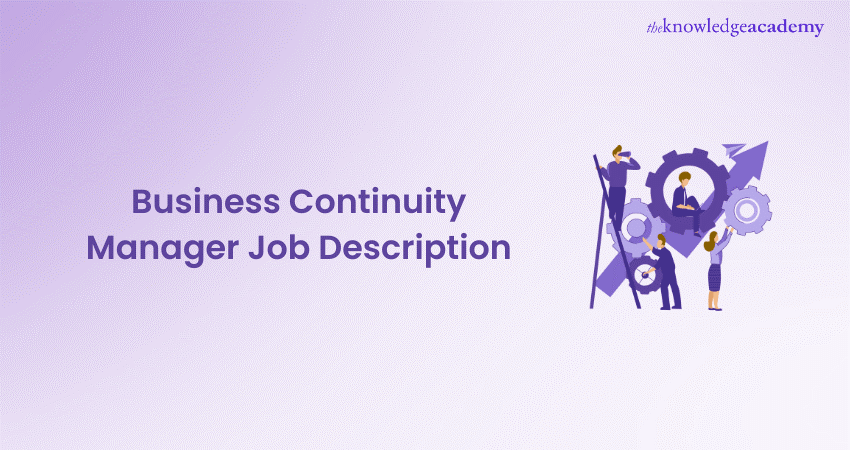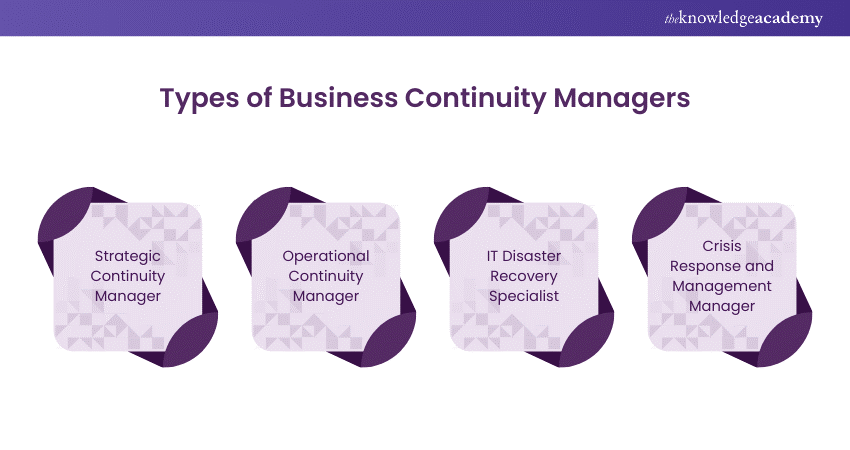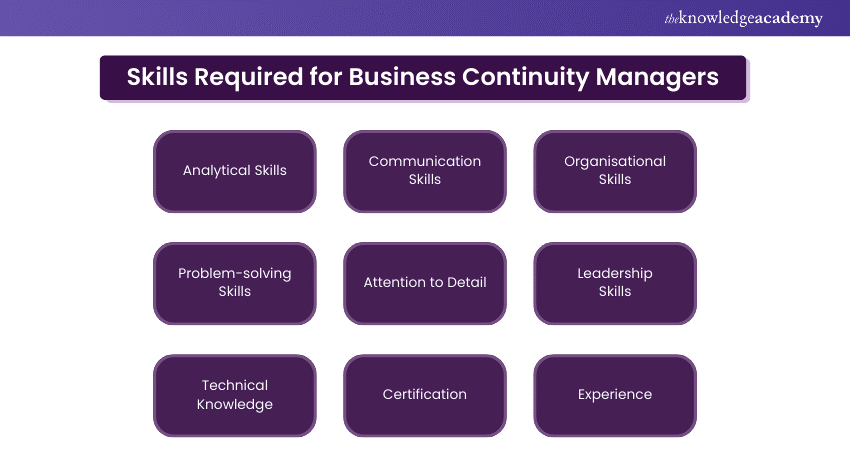We may not have the course you’re looking for. If you enquire or give us a call on +49 8000101090 and speak to our training experts, we may still be able to help with your training requirements.
Training Outcomes Within Your Budget!
We ensure quality, budget-alignment, and timely delivery by our expert instructors.

Ensuring a business can bounce back from disruptions is vital, and that's where a Business Continuity Manager (BCM) comes in. These professionals safeguard the company's resilience. In this blog, we discuss the Business Continuity Manager Job Description, diving into the roles, responsibilities, and skills needed for success.
Whether you're curious about this critical position or aspiring to become a BCM, you find valuable insights here. Join us to learn how BCMs keep organisations stable and ready to face any challenge.
Table of Contents
1) Who is the Business Continuity Manager?
2) Roles and Responsibilities of Business Continuity Manager
3) Types of Business Continuity Managers
4) Essential Skills and Qualifications for Business Continuity Managers
5) Template for a Business Continuity Manager Job Description
6) Conclusion
Who is the Business Continuity Manager?
A Business Continuity Manager (BCM) is a professional responsible for ensuring that an organisation can continue its operations during and after a disruption. This role is critical for maintaining the resilience of a company, safeguarding its assets, and protecting its reputation.
The BCM develops, implements, and manages strategies to mitigate risks and prepare for emergencies. They ensure that business operations can recover quickly after an incident.
Roles and Responsibilities of Business Continuity Manager
The roles of a Business Continuity Manager are crucial for the stability of an organisation. Here are some key areas they focus on:
1) Incident Response
BCMs are responsible for coordinating the response to incidents that disrupt business operations. This includes:
a) Identifying the nature and scope of the incident.
b) Activating the business continuity plan.
c) Coordinating with the stakeholders to manage the incident.
d) Ensuring that communication flows effectively during the incident.
2) Documentation and Reporting
Accurate documentation and reporting are vital for effective business continuity management. Responsibilities include:
a) Maintaining detailed records of incidents and responses.
b) Preparing reports for senior management and stakeholders.
c) Ensuring that all documentation is up-to-date and accessible.
3) Continuous Improvement
BCMs are tasked with continually improving the business continuity processes. This involves:
a) Conducting reviews and audits of the business continuity plan.
b) Identifying areas for improvement and implementing changes.
c) Keeping up-to-date with the best ways to do things and the latest trends.
4) Coordination and Communication
Coordination and communication are important for a successful business continuity strategy. The BCM:
a) Coordinates with various departments to ensure alignment with the business continuity plan.
b) Communicates roles and responsibilities to employees.
c) Engages with external partners and stakeholders to ensure comprehensive coverage.
5) Policy Development
BCMs develop and implement policies related to business continuity. Key tasks include:
a) Creating policies that support the business continuity plan.
b) Ensuring that policies comply with relevant regulations and standards.
c) Reviewing and updating policies regularly.
6) Training and Awareness
Training and awareness are critical components of business continuity. Responsibilities include:
a) Developing and delivering training courses for employees.
b) Conducting drills and simulations to test the effectiveness of the business continuity plan.
c) Raising awareness about the importance of business continuity.
7) Plan Development
BCMs are responsible for developing and maintaining the business continuity plan. This includes:
a) Identifying critical business functions and processes.
b) Developing strategies to ensure the continuity of these functions.
c) Documenting the plan and ensuring it is accessible to all relevant parties.
80 Risk Assessment
Risk assessment is a core responsibility of BCMs. This involves:
a) Identifying potential risks to business operations.
b) Assessing the impact of these risks.
c) Developing mitigation strategies to minimise the risk to acceptable levels.
Learn about the implementation of business continuity with our ISO 22301 Lead Implementer Course – Join today!
Types of Business Continuity Managers
There are several types of Business Continuity Managers, each focusing on different aspects. Here are some common types:

a) Strategic Continuity Manager: A Strategic Continuity Manager focuses on the long-term strategies and policies for business continuity. They work with senior management to align business continuity efforts with the overall business strategy.
b) Operational Continuity Manager: An Operational Continuity Manager is responsible for the day-to-day implementation of the business continuity plan. They ensure that operational processes are in place and functioning as intended.
c) IT Disaster Recovery Specialist: An IT Disaster Recovery Specialist focuses on the continuity of IT systems and data. They develop plans to ensure that IT services can be restored after a disruption.
d) Crisis Response and Management Manager: A Crisis Response and Management Manager specialises in handling crises and emergencies. They coordinate the immediate response to incidents and manage the communication and coordination efforts during a crisis.
Learn business continuity with our ISO 22301 Certified Business Continuity Management Course – Join today!
Essential Skills and Qualifications for Business Continuity Managers
Business Continuity Managers need a diverse set of skills and qualifications. Here are some essential ones:

a) Analytical Skills: Skill in analysing complex situations and developing effective solutions.
b) Communication Skills: Effective communication skills to interact with various stakeholders.
c) Organisational Skills: Skills to manage multiple tasks and prioritise effectively.
d) Problem-solving Skills: Aptitude for identifying problems and developing innovative solutions.
e) Attention to Detail: Ensuring that all aspects of the business continuity plan are thoroughly considered and documented.
f) Leadership Skills: Ability to lead teams and coordinate efforts across departments.
g) Technical Knowledge: Understanding of IT systems and disaster recovery processes.
h) Certification: Relevant Certifications such as Certified Business Continuity Professional (CBCP) or ISO 22301 Lead Implementer.
i) Experience: Proven experience in business continuity planning, risk management, and emergency response.
Template for a Business Continuity Manager Job Description
|
Job Title: Business Continuity Manager (BCM) Location: [Company Location] Job Type: Full-time About Us: [Company Name] is dedicated to ensuring the resilience and stability of our operations. We focus on safeguarding our business against disruptions and maintaining our high standards of service. Our team values integrity, collaboration, and proactive planning. Job Summary: We are seeking a dedicated Business Continuity Manager (BCM) to join our team. The candidate will have a passion for risk management and ensuring business continuity. This role involves developing strategies to protect our operations and ensure quick recovery from disruptions. Key Responsibilities: a) Conducting risk assessments to identify threats to business operations. b) Developing and maintaining the business continuity plan to ensure effective response to incidents. c) Coordinating incident response efforts and communicating with internal and external stakeholders. d) Documenting incidents and preparing detailed reports for senior management. e) Continuously improving business continuity processes and staying informed about best practices. f) Providing training and raising awareness about business continuity across the organisation. g) Collaborating with various departments to align continuity efforts with overall business goals. h) Ensuring compliance with relevant regulations and standards. Qualifications: a) Bachelor’s degree in Business Administration, Management, or a related field. b) Proven experience in business continuity planning, risk management, or a similar role. c) Strong analytical skills to assess risks and develop effective solutions. d) Excellent communication and leadership skills. e) Skill to handle multiple tasks and prioritise effectively. f) Attention to detail and strong organisational skills. g) Relevant certifications such as Certified Business Continuity Professional (CBCP) or ISO 22301 Lead Implementer are a plus. What We Offer: a) Competitive salary based on experience and qualifications. b) Benefits package including health, dental, and retirement plans. c) Opportunities for professional growth and development. d) A supportive and collaborative work environment. How to Apply: Submit your resume and cover letter to [email address] by [application deadline]. |
Conclusion
A Business Continuity Manager ensures an organisation can recover from disruptions by focusing on incident response, documentation, and risk assessment. To succeed, they need skills in analysis, communication, organisation, problem-solving, and leadership, along with technical knowledge and certifications. Understanding the Business Continuity Manager Job Description is crucial for those aiming to excel in this role and positively impact their organisation’s resilience.
Learn to develop your own business continuity programme with our Certified Business Continuity Management Professional (CBCMP) Course – Join today!
Frequently Asked Questions

BCM enables a company to resume normal operations after disruptions and with fewer losses. It also reduces risk, increases customer confidence, ensures compliance with the law and safeguards the company’s image.

The first step in BCM is conducting a risk assessment to identify threats and their impact on business operations. This helps in understanding vulnerabilities and prioritising resources for effective planning.

The Knowledge Academy takes global learning to new heights, offering over 30,000 online courses across 490+ locations in 220 countries. This expansive reach ensures accessibility and convenience for learners worldwide.
Alongside our diverse Online Course Catalogue, encompassing 17 major categories, we go the extra mile by providing a plethora of free educational Online Resources like News updates, Blogs, videos, webinars, and interview questions. Tailoring learning experiences further, professionals can maximise value with customisable Course Bundles of TKA.

The Knowledge Academy’s Knowledge Pass, a prepaid voucher, adds another layer of flexibility, allowing course bookings over a 12-month period. Join us on a journey where education knows no bounds.

The Knowledge Academy offers various Business Continuity Training, including the Certified Business Continuity Management Professional (CBCMP) Course and ISO 22301 Certified Business Continuity Management Course. These courses cater to different skill levels, providing comprehensive insights into Business Resilience vs Business Continuity.
Our Business Improvement Blogs cover a range of topics related to Business Continuity, offering valuable resources, best practices, and industry insights. Whether you are a beginner or looking to advance your Business Continuity knowledge, The Knowledge Academy's diverse courses and informative blogs have got you covered.
Upcoming Business Improvement Resources Batches & Dates
Date
 Certified Business Continuity Management Professional (CBCMP)
Certified Business Continuity Management Professional (CBCMP)
Thu 1st Jan 1970







 Top Rated Course
Top Rated Course



 If you wish to make any changes to your course, please
If you wish to make any changes to your course, please


